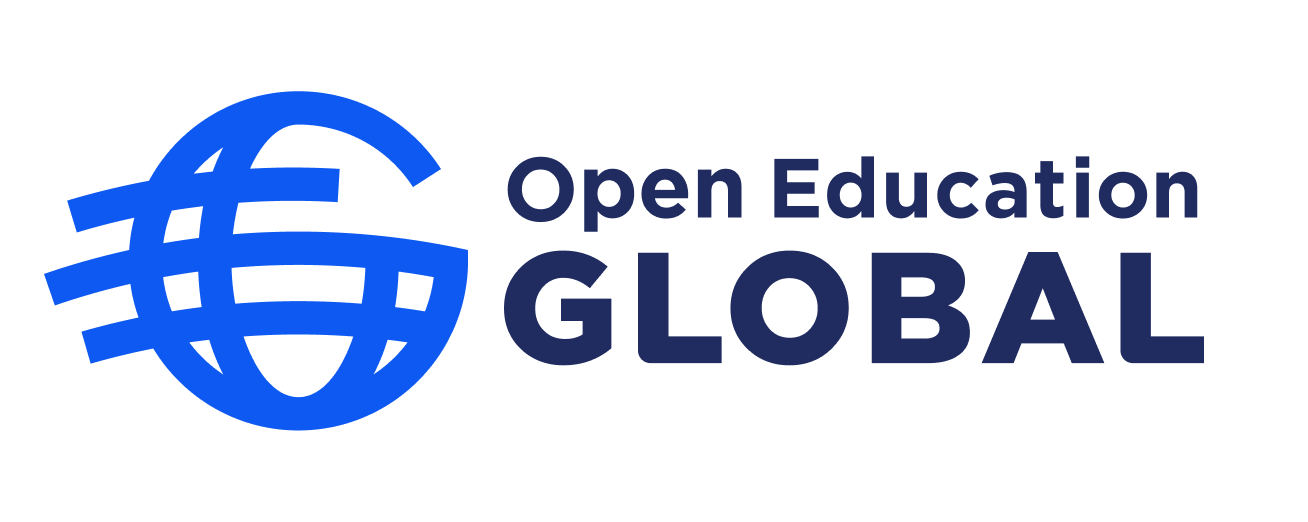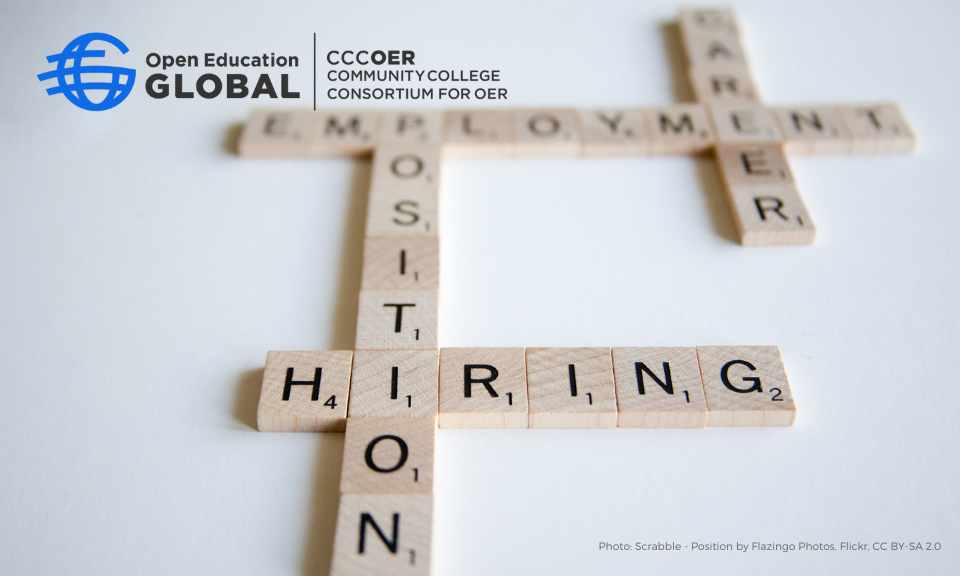OE Global is seeking a passionate, experienced open education leader to join our team to advance the field of open education at community and technical colleges across North America. The program director will manage the daily operations of the Community College Consortium for OER, otherwise known as CCCOER. The Program Director will liaise with multiple internal and external stakeholders of OE Global, working with members to develop and lead the next phase of open education innovation. They will closely coordinate with the OE Global Co-Executive Directors and the CCCOER Executive Council to support community engagement, communications, long-term planning, and fiscal sustainability.
The position is a full-time remote position reporting to the Executive Directors of Open Education Global. The position and application details are below.
If you have any questions regarding this position, please email jobs@oeglobal.org. Please note: applications will only be accepted via the form linked below.
Position Description
Position: Program Director, Community College Consortium for OER (CCCOER)
Location: Remote. This is a virtual position, but preference is for someone based in North America, given the primarily regional focus of the membership. You will mainly work remotely – at OEGlobal, we value teamwork and a consensus-oriented approach. Access to a computer with reliable and secure internet connectivity is essential.
Closing date: The closing date for applications is August 21, 2023. However, we will be screening candidates and scheduling interviews with short-listed candidates on a rolling basis. Accordingly, we encourage you to apply early.
Term: This is a full-time position to join the OE Global staff. The selected candidate will report directly to the Co-Executive Directors of OE Global.
Salary: Salary is commensurate with experience. The selected candidate will be responsible for maintaining a suitable home office for remote work.
The CCCOER Director
- Has overall managerial responsibility for the CCCOER regional node.
- Facilitates and communicates a clear vision to funders, members, staff, and the open education community.
- Generates support and enthusiasm for the CCCOER program to OE Global members, postsecondary institutions, library consortiums, and government agencies focused on open education.
- Develops a timeline of short- and long-term goals for growing and maintaining the advocacy and professional development work of CCCOER.
- Promotes and supports CCCOER by participating in stakeholder meetings, events, conference presentations, and webinars, including funder communications and development.
- Develops and implements a plan to measure strategic plan goal attainment and maintain momentum.
- Contributes to OE Global’s overall membership growth, retention, and engagement strategies.
- Communicates program successes and promotes the successes of members’ open education initiatives.
Essential Functions:
- Leadership and Community Building: Engage staff and Executive Council in the growth and delivery of the CCCOER member programs — act as the spokesperson, communicating program successes internally and externally at North America and international events. Develop new and maintain existing partnerships and strategic relationships with organizations, donors, and state and provincial governments.
- Operations: Develop and execute operational strategies that support CCCOER’s and OE Global’s strategic plans and membership needs. Oversee the efficient and effective operation of CCCOER to realize organizational objectives, including budget development and management. Ensure member input and satisfaction through regular communications, including online and in-person meetings. Provide regular input to OE Global Co-Executive Directors and staff on developments and needs specific to community colleges, and provide input to and help manage overall OE Global’s membership processes, including membership management, offerings, and programs.
- Programming and Services: Lead the planning, implementation, and evaluation of CCCOER programs to strengthen its mission and network, including the monthly webinar series, community email list, member-only activities, and other contractual obligations. Highlight the impact of open education at community colleges through communications on websites, social media, and traditional media outlets. Assist with planning and implementation of OE Global programming.
- Business Planning and Fundraising: Identify potential open education collaboration opportunities through cultivating strategic and mutually beneficial relationships with foundations, donors, corporations, and other partners. In collaboration with the OE Global Co-Executive Directors, develop and execute a fundraising plan to offer strategic program offerings and services.
Required Qualifications and Experience:
- Bachelor’s degree in Education, Curriculum Design, Communications, Information Science, Library Science, or any academic discipline.
- Experience in building and managing diverse teams.
- Demonstrated experience with open education, open educational resources, and related topics.
- Experience with web-based publishing and social media.
- Experience tracking and measuring outcomes.
- Experience in managing data collection, analysis, and sharing for making and communicating data-informed decisions.
- Experience managing complex projects, including people management, budgeting, report writing, etc..
- Demonstrated track record of successfully working and managing a team remotely.
Required Knowledge, Skills, and Abilities:
- Has experience analyzing community needs and synthesizing resources to support the community; experience communicating with various stakeholders.
- Has the willingness and ability to work collaboratively and cooperatively with others; participates and fosters teamwork; promotes cooperation and commitment within a team to achieve goals and deliverables.
- Makes timely, informed decisions that consider the facts, goals, constraints, and risks; ability to use professional judgment in complex situations; effectively and appropriately deals with/adapts to change; demonstrates critical, creative, and reflective thinking.
- Takes responsibility for own performance by setting clear goals and balancing critical job requirements through task management, results orientation, and problem-solving skills.
- Adheres to high standards of integrity and honesty.
- Values open-mindedness, inclusion, multicultural perspective, and multiple ways of knowing, thinking, and being. Helps create a work environment that embraces and appreciates diversity.
- Communicates effectively and collaboratively with staff and leadership; applies effective written and oral communication techniques to convey clear and timely messages; builds constructive working relationships characterized by a high level of acceptance, cooperation, and mutual respect.
- Adapts to changing business needs, conditions, and work responsibilities; responds to change with a positive attitude and a willingness to learn new ways to accomplish work activities and objectives.
- Utilizes excellent time management and problem-solving techniques, and use of professional judgment in complex situations; demonstrates strong project management skills.
Desired Qualifications
- Master’s degree in Education, Curriculum Design, Communications, Information Science, Public Administration, or any academic discipline.
- Experience in a higher education environment, preferably at community or technical colleges in North America.
- Two years of work experience with open education and open content issues.
- Knowledge and understanding of U.S. and international intellectual property and copyright laws.
- Training or experience in instructional design principles.
How to Apply
Deadline: August 21, 2023
Open Education Global is committed to diversity and multiculturalism, and we welcome applications from all who meet the requirements. Studies have shown that people marginalized by racism and/or sexism are less likely to apply for jobs unless they meet every listed qualification. If you are unsure if you meet the listed requirements but believe you can perform the job as described, we encourage you to apply.
About Community College Consortium for Open Educational Resources (CCCOER)
The Community College Consortium for Open Educational Resources (CCCOER) drives awareness and adoption of open educational policies, practices, and resources to close equity gaps, particularly for traditionally underserved students. CCCOER membership represents 104 colleges across 37 states and provinces of North America. CCCOER is a regional node of Open Education Global. Visit the CCCOER website to find out more.
About Open Education Global
Open Education Global is a member-based, global non-profit supporting the development and use of open education to empower learners worldwide. We envision a world where everyone, everywhere, has access to the high-quality education and training they desire; where education is seen as an essential, shared, and collaborative social good; and where open educational practices facilitate access, equity, and opportunity. For more information, please visit the OE Global website.

